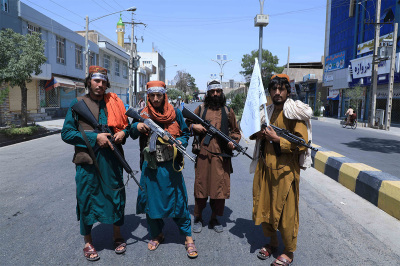
The collective gasp in the sanctuary on Sunday was audible. Amidst the celebrations of Palm Sunday, my pastor told us about the email that around 25 members of our community had received just days before. I have since read that email for myself. I am stunned and devastated.
For more than a year, we have had the great privilege of worshiping alongside a small group of Afghan refugees — Christians who fled the Taliban. These are strong, brave people, all of whom were forced to flee Afghanistan — their homes, their extended families, all they knew — following arrest and torture by the Taliban for their faith. I do not use the word “torture” lightly. I have heard first-hand the stories of their imprisonment, and it is like the worst scenes from a movie, the scenes during which I close my eyes, unable to watch. This is what our brothers and sisters, my friends, have endured.
Their journeys to the United States were harrowing, long and complicated, but they all entered the U.S. legally. That is not actually an easy thing to do. Immigration authorities interview individuals to assess whether they face a credible fear of persecution and torture in their home countries. All of these individuals were deemed to face such a credible fear and were granted documented, legal status to be in the country, to obtain work permits, to get driver licenses, to rent apartments — to do all the normal things they need to do to be self-supporting.
Following that interview, all of these people applied for asylum, which is a much longer process. It can take months, or even years, to get in front of a judge who can rule on an asylum application. However, all of these individuals have taken those steps and have open asylum cases. There are future court dates set. They are following all the rules.
And that is crucial in all of this. These are not criminals. They are not members of foreign, violent gangs. They have not committed crimes while they have been in the United States. They did not enter illegally. They are not undocumented. There is a far more complicated conversation to be had about immigrants in those categories. The discussion around these Afghan Christians is much more straightforward.
Despite following all of the rules and procedures, these Afghan Christians are now facing deportation. They have been given seven days to leave the country. As of today, four days left.
But they have nowhere to go. The only legal option available to them is to return to Afghanistan. If they do so, they will be tortured and killed. This is not just a possibility, but a certainty. And it is not just these 25 Christians, but hundreds like them across the country. Additionally, this same action also applies to Afghans who risked their lives to work with the U.S. military during our years of operations in the country. These are our brothers and our allies.
On two fronts, then, this should disturb us and drive us to action. As Christians, we recognize that government authority comes from God. We also, however, recognize that there are just and unjust governments. Perhaps the most well-known passage in Scripture related to government is Romans 13, where Paul writes in verse 1 that everyone should “be subject to the governing authorities. For there is no authority except from God.” But he also writes, in verses 3 and 4, that, “rulers are not a terror to good conduct, but to bad. Would you have no fear of the one who is in authority? Then do what is good, and you will receive his approval … But if you do wrong, be afraid.”
These Afghan Christians have been doing, and continue to do, what is good. They have done nothing wrong. They should not fear those who are in authority. No one facing credible fear of persecution and torture in their home countries should, after fleeing to the United States, be forced to live in fear here. And yet they are, this week, living in very real fear.
Along with Paul, then, “I urge that supplications, prayers, intercessions, and thanksgivings be made for all people, for kings and all who are in high positions, that we (and our Afghan Christian brothers and sisters) may lead a peaceful and quiet life, godly and dignified in every way” (1 Timothy 2:1-2). I commend these refugees who are following Paul’s instruction to “aspire to live quietly, and to mind your own affairs, and to work with your hands, as we instructed you, so that you may walk properly before outsiders and be dependent on no one” (1 Thessalonians 4:11-12).
Not only as Christians, but also as Americans, this is not who we should ever be. We are a country that invites the “huddled masses yearning to breathe free.” At the very core of our identity are founding ideals of freedom, religious liberty, and justice. In the Declaration of Independence, Jefferson writes that all men are endowed by God with rights to life, liberty, and the pursuit of happiness, and that governments are instituted among men for the purpose of securing these rights. That is what we are asking the U.S. government now to do. These Afghan Christians ask for nothing more than the chance to pursue life, liberty, and happiness. They want to work hard within our rules, take on our culture, learn our language, and live among us. They seek no government handouts, nor do they wish to conduct criminal activity. They just want to live without fear of arrest, torture, and death for their faith. This is not too much to ask.
Please pray for mercy, and write to your Senators, Representatives, and the White House. Our best hope for helping our brothers and allies is to make our collective voices heard.
Julie Tisdale has more than 20 years of experience in politics and public policy and currently works in public policy polling. She has previously lived as an immigrant in both Europe and Asia, and is currently in seminary where she is pursuing an MA in Christian Ministries.


















